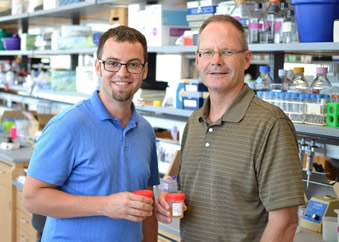About Us
Our mission is to empower people living with neuromuscular diseases to live longer, more independent lives.
Five Questions with DMD Researcher James Ervasti
James Ervasti, professor in the department of biochemistry, molecular biology & biophysics at the University of Minnesota in Minneapolis, is working to develop methods of identifying non-invasive biomarkers that can be measured in all patients across the entire spectrum of Duchenne muscular dystrophy (DMD) disease severity.
Please describe your current research in DMD.

While several new therapies DMD are currently in clinical trials, the lack of simple and reliable methods to measure their effectiveness remains an obstacle. Currently, the six-minute-walk test and quantitation of dystrophin protein in muscle biopsies are the accepted outcome measures in clinical trials. However, the six-minute walk test excludes wheelchair-bound patients from participating, while measurement of dystrophin protein requires invasive biopsies and has been challenging to standardize across trial centers. Therefore, we are developing methods to identify non-invasive biomarkers that can be measured in all patients across the entire spectrum of disease severity.
We have found evidence that small molecules, termed “metabolites,” involved in cellular energy production may serve as biomarkers for DMD. In our MDA funded research, we will measure these metabolites in a large group of DMD patients and in several different mouse models of DMD to compare the metabolite levels with disease severity.
Our experiments could provide new insight into the skeletal muscle dysfunction in DMD patients and identify new biomarkers that significantly improve clinical trial design and assessment while opening clinical trials to non-ambulatory DMD patients.
Is this your first MDA grant?
No. My first MDA grant was the Carl M. Pearson Fellowship awarded in 1990, which provided me important encouragement to continue studying DMD. MDA has provided the critical first support to several studies leading to my most important research discoveries over my career.
What inspired you to study DMD?
Muscle biology and disease became my research passion while studying the muscle disease malignant hyperthermia for my Ph.D. thesis. Dr. Kevin Campbell invited me to join his laboratory in 1989 and provided me with a dream project to identify the glycoprotein that anchors dystrophin to the muscle plasma membrane. I’ve been studying dystrophin and its associated proteins ever since. I remain inspired to carry out research that will help improve outcomes for all the MD patients that I have had the privilege to meet.
What is your focus within the DMD field, and why is it important?
While I am most recognized for my biochemical studies of dystrophin and utrophin structure/function, this MDA grant funds an entirely new research direction led by Dr. Chris Chamberlain to identify metabolites in urine that can give insight into disease progression and hopefully provide more immediate feedback on the effectiveness of therapies in clinical trials.
While severely debilitating and ultimately fatal, DMD progresses over decades and we need to know more immediately whether therapies that work in dystrophic animal models also drive measureable improvement in human patients.
Why is it important that MDA continue to fund research in DMD?
In my 25 years, MDA has been the funding organization most willing to support young scientists and exciting new research directions. The MDA’s past investment has paid huge dividends in advancing new therapies and I believe continued investment is more important than ever given the increasingly stiff competition for government research support.
What do you feel people impacted by DMD can have the most hope about with respect to research right now?
The Muscular Dystrophy research community is a creative, relentlessly driven and collaborative group of scientists all with the singular focus to defeat Duchenne and all other forms of muscular dystrophy.
To learn more about how MDA research is accelerating treatments and cures for DMD, please visit mda.org.